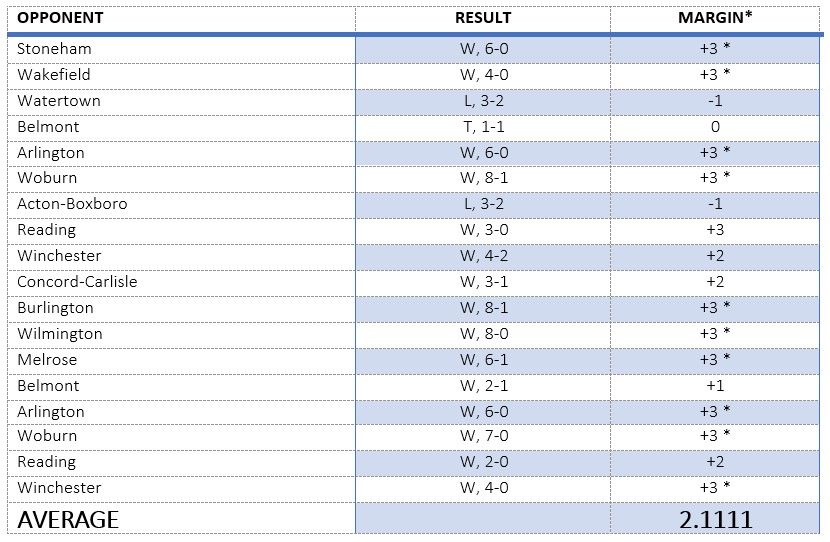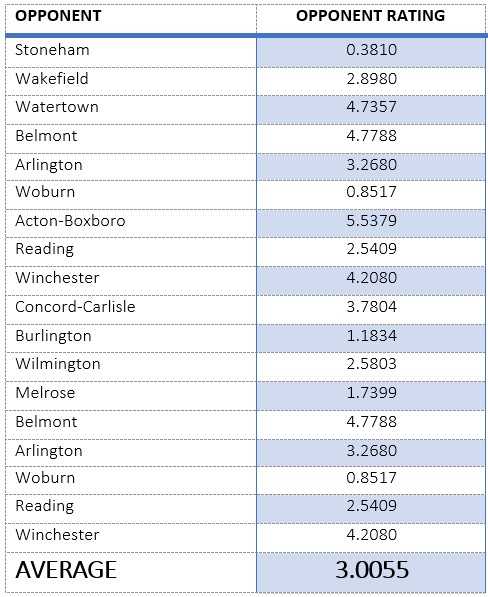Summary
The MIAA Power Ratings formula, which has been used in conjunction with the Statewide Tournament since its inception in Fall 2021, is a basic algorithm consisting of two components:

Why is Margin of Victory important?
In the MIAA we have leagues varying in number of teams, number of divisions and strength of teams. Most MIAA schools do not create schedules independently but are provided a league schedule for each sport. If a school is in a league where there is a large and small conference break out, crossover games add to the difficulty of a fair rating formula. The differing status of leagues within the MIAA structure can pose challenges to fair and equitable rating of teams.
Margin of Victory (MOV) is a consistent factor used to develop a fair comparison of the very different leagues across the state. The Margin of Victory gives a linear factor that is consistent across the state. By capping the point differential sport by sport, it removes the motivation of coaches to run up the score and still gives us a quality rating formula.
TMC has set the Margin of Victory caps by sport to be utilized in the Power Rating formula. Margins are set to take into consideration sportsmanship while still keeping the power rating formula fair, transparent and accurate.
FALL SPORTS | SPRING SPORTS | ||
| SPORT | MoV CAP | SPORT | MoV CAP |
| Field Hockey | 3 | Baseball | 5 |
| Football | 14 | Lacrosse | 7 |
| Soccer | 3 | Rugby | 10 |
| Volleyball | 3 * | Softball | 5 |
WINTER SPORTS | Tennis | 3 * | |
| SPORT | MoV CAP | Volleyball | 3 * |
| Basketball | 6 | * MoV is total matches (Tennis) or sets (Volleyball), not individual set scores. | |
| Ice Hockey | 3 | ||
NOTE: On October 21, 2025, the MIAA Tournament Management Committee approved a reduction in the Margin of Victory cap for Basketball from 10 to 6.
How the formula works
Here is an example in two parts, using the LEXINGTON field hockey team (record of 15-2-1) from the 2019 season.
Average Margin of Victory
The first piece is a team’s Average Margin of Victory, which for Field Hockey is capped at 3 goals in any single game (see MoV chart above):
So the Average Margin of Victory for Lexington (adjusted for the 3-goal cap), is 2.1111 … which goes into the first half of the formula. These numbers won’t change for any individual games once they are played.

Average of Opponents' Ratings
The second piece is a team’s Average of Opponents’ Ratings, which is a measure of the strength of your competition (in essence, Strength of Schedule). This is the more complex part, and where the computer and “iteration” are involved.

These numbers will change any time an opponent plays a game, or any of its opponents play, etc. Essentially, any game played across the state can, and will, affect the ratings of any and all teams – even if by only a couple of decimal places.
So to get Lexington’s rating, simply add the two numbers together:
- AVERAGE MARGIN of VICTORY (adjusted) = 2.1111
- AVERAGE of OPPONENTS’ RATINGS = 3.0055
- LEXINGTON’S RATING = 5.1166
The key part of the system is that, for each of Lexington’s opponents from the 2019 season, that Rating number (5.1166) is used as the second part of the formula to determine each of those teams’ ratings numbers. It is circular, but the iterative calculation does all of the work. And all of those numbers will continue to change as more and more games are played.
There is no Strength of Schedule component explicitly built into the formula, but a team’s Strength of Schedule essentially is the Average of its Opponents’ Ratings. The better teams you play, the higher this number will be … and in turn, the better a team’s Rating will be.
With this system, because every team’s rating depends on every other team’s rating, all teams can be “connected” in some way (except, in very rare cases, when an entire league has no out-of-league opponents).
How do divisions or leagues play into the formula?
Because every team has the same starting point in a given season – there are no point values, weights or other “bias” taken into consideration – there is no penalty for a team to face a good Division 3 opponent vs. a weaker Division 1 opponent. Also, a team’s rating can’t be easily distorted by facing opponents with strong records against weak competition.
If Team A beat Team B, why is Team B rated higher?
There always will be examples of a team being rated lower than a team it beat, and vice versa. Any set of power ratings will produce some contradictions … it’s unavoidable. The key is to have as few contradictions as possible. Or, more precisely, to minimize the total magnitude of all the contradictions.
Out-of-State Opponents in the Power Rating Formula
All games played before the cutoff date will count in the power rating formula, including those vs. out-of-state teams that are approved members of their respective state associations.
Example 1: MIAA Team A plays out-of-state Team B, which doesn't play any other MIAA opponents.
- The out-of-state opponent earns a rating for that contest equal to the MIAA opponent's rating, plus or minus the Margin of Victory (capped) for that contest:
- MIAA Team A rating: 10.0000
- Result of contest: 3-point victory
- Team B rating: 7.0000 ... (which is the Team A rating minus 3 points for the loss)
- Reversing the process, Team A's rating for that contest is 7.0000 (Team B rating) + 3 points for victory = 10.0000 ... which is EXACTLY Team A's rating.
Example 2: MIAA Team C plays out-of-state Team D, which also plays other MIAA opponents (one or more).
- The out-of-state opponent gets a power rating based on all games it plays vs. MIAA opponents (regardless of how many), which serves as another data point used to compare all MIAA teams.
In summary, playing a contest against an out-of-state opponent has no adverse effect on the Power Ratings formula.
How does a forfeited contest factor into the Power Rating?
The MIAA Tournament Management Committee approved a change to the Power Ratings formula, effective with the Spring 2024 season, to account for forfeited contests.
- Any contest that is forfeited – regardless of whether it is played and forfeited after the fact, or a forfeit is awarded without the contest being played – will be removed from the “Opponent Value” portion of the power rankings. However, a team still will receive the maximum Margin of Victory ( + or - ) toward the “Own Value” portion of the power rankings for the affected contest. NOTE: This adjustment is made after the power rankings are calculated, so as not to impact the “Opponent Value” calculation for any teams.
- A forfeiting team must have a minimum number of qualifying contests for that sport in the power rankings to be eligible for the postseason. (Teams receiving forfeit victories are not affected by this rule.)
CLICK HERE for a more detailed breakdown of the new "Forfeited Contest" process approved by TMC on February 29, 2024.